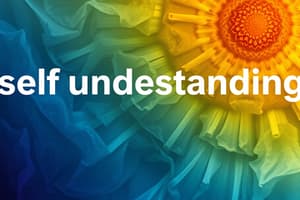Podcast
Questions and Answers
Which of the following ideas is primarily linked to the concept of understanding oneself?
Which of the following ideas is primarily linked to the concept of understanding oneself?
- Perception shapes reality.
- Self-reflection leads to personal growth. (correct)
- Knowledge is inherently subjective.
- Human instincts drive behavior.
What is considered a barrier to self-understanding as suggested by philosophical traditions?
What is considered a barrier to self-understanding as suggested by philosophical traditions?
- Excessive rationalization
- Emotional suppression
- Intellectual arrogance
- Social conformity (correct)
What philosophical approach is primarily associated with the understanding of self in the context provided?
What philosophical approach is primarily associated with the understanding of self in the context provided?
- Empiricism
- Existentialism
- Dualism
- Socratic Method (correct)
Which of the following does not contribute to the understanding of self according to philosophical inquiry?
Which of the following does not contribute to the understanding of self according to philosophical inquiry?
In the context of self-understanding, what role does dialogue typically serve?
In the context of self-understanding, what role does dialogue typically serve?
Match the following philosophers with their contributions to understanding the self:
Match the following philosophers with their contributions to understanding the self:
Match the following terms with their definitions in the context of self-understanding:
Match the following terms with their definitions in the context of self-understanding:
Match the following concepts with their associated meanings:
Match the following concepts with their associated meanings:
Match the following barriers to self-understanding with their descriptions:
Match the following barriers to self-understanding with their descriptions:
Match the following methods of self-discovery with their approaches:
Match the following methods of self-discovery with their approaches:
Flashcards are hidden until you start studying
Study Notes
Philosophical Approach to Self-Understanding
- Existentialism emphasizes individual experience and responsibility in shaping self-understanding.
- Phenomenology focuses on lived experience and consciousness to grasp the essence of the self.
Ideas Linked to Self-Understanding
- Self-reflection is crucial for introspection and gaining insight into one's thoughts, feelings, and motivations.
- Self-awareness involves recognizing one's own existence and characteristics.
- Authenticity entails living in accordance with one's true self, values, and beliefs.
Barriers to Self-Understanding
- Preconceived notions and biases can distort self-perception.
- Fear of self-discovery or confronting uncomfortable truths may obstruct self-understanding.
- Social pressures and expectations can lead to a disconnect between one's true self and projected persona.
Role of Dialogue in Self-Understanding
- Dialogue with others facilitates external perspectives and challenges assumptions.
- Sharing experiences and engaging in reciprocal conversations helps refine self-perception.
- Interacting with diverse viewpoints broadens understanding and fosters growth.
Factors Not Contributing to Self-Understanding
-
Passive acceptance of societal norms without critical examination.
-
Reliance solely on external validation rather than introspection.
-
Avoidance of challenging self-reflection and honest introspection.
-
Philosophical Approaches to Self-Understanding
- Identify the primary philosophical approach associated with self-understanding within the provided context.
- Determine which ideas are centrally connected to the concept of self-understanding.
- Recognize obstacles to self-understanding as highlighted by philosophical traditions.
- Explain the role of dialogue in fostering self-understanding.
- Identify factors that do not contribute to self-understanding according to philosophical inquiry.
-
Philosophers and Their Contributions to Self-Understanding
- Match philosophers with their specific contributions to the understanding of the self. (Requires a list of philosophers and their theories to complete this point).
-
Key Terms and Definitions in Self-Understanding
- Provide definitions of relevant terms within the context of self-understanding. (Requires a list of terms to complete this point).
-
Concepts and Associated Meanings in Self-Understanding.
- Match concepts with their corresponding meanings within the framework of self-understanding. (Requires a list of concepts to complete this point).
-
Barriers to Self-Understanding and Their Descriptions
- Match barriers to self-understanding with their detailed descriptions. (Requires a list of barriers to complete this point).
-
Methods of Self-Discovery and Their Approaches
- Match methods of self-discovery with explanations of their respective approaches. (Requires a list of methods to complete this point).
Studying That Suits You
Use AI to generate personalized quizzes and flashcards to suit your learning preferences.




